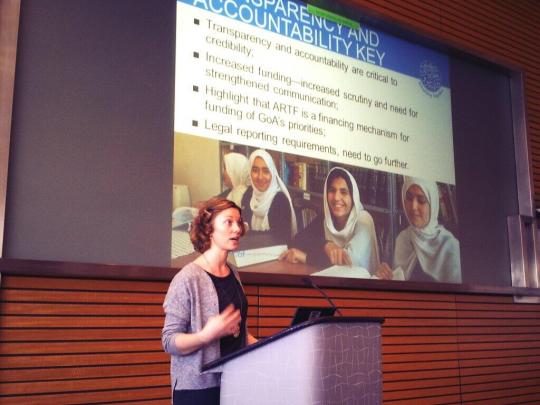
around #opendata in Afghanistan. Photo: Sandra Moscoco
There's a lot of energy around the role of open data in development. There are talks of data fueling 'smart cities,' citizen engagement in planning and budgeting, public transparency and accountability, entrepreneurship (even without open data), and more.
These show the promise of open data, which doesn’t come easy in stable governments. But how does open data play out in the context of fragile states and conflict situations?
Last year, we asked ourselves these questions and reached out to the aid community.
Colleagues doing work in fragile states responded with examples of how open data is helping to meet development objectives. They described situations, where development has been stumped by either data scarcity, or where data-rich, security-related sensitivities prevailed.
Below are excerpts from an event where the examples were shared.
Afghanistan
In Afghanistan, which has been in conflict for what can be considered decades, the Afghanistan Reconstruction Trust Fund (ARTF) brings together 33 donors and billions of dollars to address development objectives around health, infrastructure, education, governance, agriculture and more. World Bank Operations Officer, Ditte Fallesen, described transparency and accountability as critical to credibility especially in regard to donors. Donors need information to be able to clearly articulate to their constituencies the value of the work funded via the ARTF in order to continue contributions. The ARTF has been able to build and maintain trust by proactively going beyond the requirements of the trust fund agreement and staying ahead of evolving information needs. Among other efforts, the ARTF opened its financial data in 2013, and its results data in 2014.
Nepal
Nepal is still recovering from a decade-long civil war. The population is full of confusion and fear. Data has the promise of providing objective guidance to government, advocates, and citizens. Code for Nepal has been launched with the aim of helping the media use data to tell stories, as part of their commitment to building digital literacy in under-served communities. Journalists are trained to clean, structure and analyze data. Co-founder Ravi Kumar shared the vision opportunities offered by open data for access to information, jobs, and particularly, support of women.
Malawi
The Malawi Spacial Data Portal was launched by the Government as a critical step in reducing risks associated with natural disasters. The portal combined hazard elements (like soil maps and topography) with exposure (population density +) and vulnerability functions (past event damage) to generate disaster risk assessments, improved inter-agency collaboration, and enhanced public access to data. Disaster Management Specialist, Francis Nkoka, suggested that the focus of open data should be on fostering innovation, enabling the public to load their own data, create maps and get to usefulness as quickly as possible.
Palestine
YouKnow is a platform to be launched by Taghyeer, a Palestinian nonprofit that leverages social media for social change. YouKnow is designed to channel information to the "Palestinian public in order to raise awareness of democratic processes, free speech and the need for accountability in the public sphere," said Saed Karzoun, Founder and CEO of Taghyeer.
Open Aid Partnership
Johannes Kiess (now Senior Program Officer for Gates Foundation) told about the Open Aid Partnership (OAP) which brings together governments, donors, the private sector and civil society in countries such as Haiti, Malawi and Nepal, in an effort to improve aid transparency and effectiveness.
Are you implementing open governance and open data efforts in a fragile, conflict or post-conflict situation? Share your experiences, successes and challenges.
-------------------------------------------------------------
Global Media Development program is a partnership-driven initiative which focuses on information and media as drivers of good governance.
The program facilitates both South-South and North-South knowledge exchanges by serving as a space for experts and practitioners to share investigative journalism practices (with a focus on data journalism) and strategies to overcome obstacles to effective reporting on priority development topics.


Join the Conversation